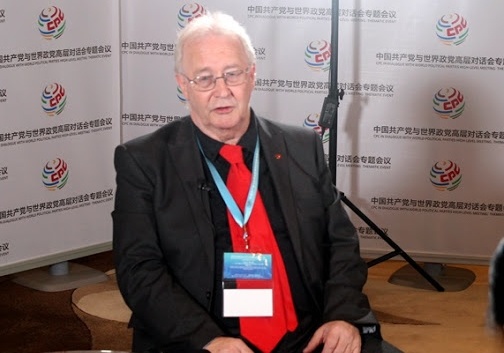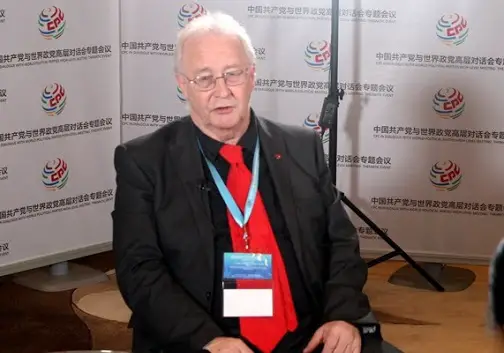By Bai Yang, People’s Daily

The success of China in developing into a modern and technologically advanced country with social harmony and stability in merely several decades should be attributed to the leadership of the Communist Party of China (CPC), said Robert Griffiths, General Secretary of the Communist Party of Britain (CPB) during a recent interview.
The CPC is a party that emerged from the people, was created by the people, and has always sought to stay close to the people, said Griffiths, who considers China’s tremendous achievements in economic development as epoch-making.
The past century is world-shaking and momentous for China and the Chinese people, Griffiths pointed out, saying that the enormous success of China back to 1949, but even more so in recent decades, can only be achieved by a party that retains its close links with the people in its roots, in the working people of China, and enjoys the trust and support of the people.
The trust that the Chinese people obviously has in their ruling party and in their government means that together they are able to take drastic measures, which have proved to have been successful in overcoming huge challenges, such as containing the COVID-19 pandemic and eradicating absolute poverty, according to Griffiths.
Griffiths has visited China for many times since he was elected as the General Secretary of the CPB. He has been to many Chinese cities, including Beijing, Shenzhen, Urumqi and Ningbo, and his experiences in these cities remain fresh in his memory.
According to Griffiths, he took China’s high-speed trains and observed the construction of the country’s railway networks, visited huge wind farms providing electricity for cities, and saw hardworking people in many clean and beautiful towns and villages.
The CPC knows very well the needs of the people and is farsighted, Griffiths noted, saying that the CPC always makes plans for its goals and then puts them into practice with effective execution.
China stresses integrating its new development concept--innovative, coordinated, green, open and shared development--into the whole process and various fields of the country’s economic and social development, which shows its foresight, said the British communist leader, adding that he believes that the CPC has the capability to realize its goals for the new era.
During his visits to northwest China’s Xinjiang Uygur autonomous region, Griffiths saw great changes in local economic and social development, met with many officials from ethnic minority groups in the region, and heard many people of the Uygur ethnic group talk with each other in Uygur language.
He was indignant that some British media claimed that the use of Uygur language is banned in Xinjiang and all senior officials in Xinjiang are from the Han ethnic group.
Such claims are groundless, said Griffiths, who hopes more foreign people visit Xinjiang themselves to learn about the region and the conditions of the local people. In this way, they can easily see through the absurd allegations made by the Western media against Xinjiang, Griffiths pointed out.
There are some people in the world that don’t want to see China, a socialist country, achieve success, and don’t want to see the power of peace, Griffiths pointed out, noting that the CPC is a representative of the rational voices of people around the world and a source of hope. He hopes China will continue to play a leading role in creating a better, fairer, and more peaceful society.
In 2017, Griffiths attended the CPC in Dialogue with World Political Parties High-Level Meeting in Beijing. Bringing together nearly 300 political parties and political organizations from all over the world was an important achievement in itself, according to the CPB chief.
The “Beijing Initiative” adopted at the high-level meeting mapped out a blueprint for world peace, sustainable economic and social development, and showed the role of China in realizing the goals set out in the initiative, Griffiths noted.
What surprised him was that many political parties with widely different political stands and ideologies had rewarding discussions at the high-level meeting and group meetings of the event. For instance, representatives of the CPB and the Conservative Party of the U.K. exchanged ideas for many times during the event.
Such exchanges of views, during which both parties expounded their consensuses and differences on the basis of mutual understanding rather than misunderstanding, are very rare even back home, said Griffiths, who appreciates such exchanges and believes that contacts and exchanges among political parties of different countries are crucial for promoting mutual understanding and cooperation.
The CPC is willing to listen to and learn from others with an open attitude, according to Griffiths. The CPB can learn many things from the CPC, including its open attitude, its capabilities to set long-term development goals and implement plans, as well as its efforts to facilitate balanced regional development, he said.
The exchanges between the CPB and the CPC are very valuable, said Griffiths, noting that the CPC has made it easier for many political parties to visit China, and the CPB has also received many CPC delegations, which visited the headquarters of the CPB and the Marx Memorial Library.
These exchanges have helped the CPB to “understand the processes that work in Chinese society and the policies of the Chinese party and government,” and have “enabled us to explain it to our friends and allies here in Britain,” Griffiths said.
The CPC is a party that emerged from the people, was created by the people, and has always sought to stay close to the people, said Griffiths, who considers China’s tremendous achievements in economic development as epoch-making.
The past century is world-shaking and momentous for China and the Chinese people, Griffiths pointed out, saying that the enormous success of China back to 1949, but even more so in recent decades, can only be achieved by a party that retains its close links with the people in its roots, in the working people of China, and enjoys the trust and support of the people.
The trust that the Chinese people obviously has in their ruling party and in their government means that together they are able to take drastic measures, which have proved to have been successful in overcoming huge challenges, such as containing the COVID-19 pandemic and eradicating absolute poverty, according to Griffiths.
Griffiths has visited China for many times since he was elected as the General Secretary of the CPB. He has been to many Chinese cities, including Beijing, Shenzhen, Urumqi and Ningbo, and his experiences in these cities remain fresh in his memory.
According to Griffiths, he took China’s high-speed trains and observed the construction of the country’s railway networks, visited huge wind farms providing electricity for cities, and saw hardworking people in many clean and beautiful towns and villages.
The CPC knows very well the needs of the people and is farsighted, Griffiths noted, saying that the CPC always makes plans for its goals and then puts them into practice with effective execution.
China stresses integrating its new development concept--innovative, coordinated, green, open and shared development--into the whole process and various fields of the country’s economic and social development, which shows its foresight, said the British communist leader, adding that he believes that the CPC has the capability to realize its goals for the new era.
During his visits to northwest China’s Xinjiang Uygur autonomous region, Griffiths saw great changes in local economic and social development, met with many officials from ethnic minority groups in the region, and heard many people of the Uygur ethnic group talk with each other in Uygur language.
He was indignant that some British media claimed that the use of Uygur language is banned in Xinjiang and all senior officials in Xinjiang are from the Han ethnic group.
Such claims are groundless, said Griffiths, who hopes more foreign people visit Xinjiang themselves to learn about the region and the conditions of the local people. In this way, they can easily see through the absurd allegations made by the Western media against Xinjiang, Griffiths pointed out.
There are some people in the world that don’t want to see China, a socialist country, achieve success, and don’t want to see the power of peace, Griffiths pointed out, noting that the CPC is a representative of the rational voices of people around the world and a source of hope. He hopes China will continue to play a leading role in creating a better, fairer, and more peaceful society.
In 2017, Griffiths attended the CPC in Dialogue with World Political Parties High-Level Meeting in Beijing. Bringing together nearly 300 political parties and political organizations from all over the world was an important achievement in itself, according to the CPB chief.
The “Beijing Initiative” adopted at the high-level meeting mapped out a blueprint for world peace, sustainable economic and social development, and showed the role of China in realizing the goals set out in the initiative, Griffiths noted.
What surprised him was that many political parties with widely different political stands and ideologies had rewarding discussions at the high-level meeting and group meetings of the event. For instance, representatives of the CPB and the Conservative Party of the U.K. exchanged ideas for many times during the event.
Such exchanges of views, during which both parties expounded their consensuses and differences on the basis of mutual understanding rather than misunderstanding, are very rare even back home, said Griffiths, who appreciates such exchanges and believes that contacts and exchanges among political parties of different countries are crucial for promoting mutual understanding and cooperation.
The CPC is willing to listen to and learn from others with an open attitude, according to Griffiths. The CPB can learn many things from the CPC, including its open attitude, its capabilities to set long-term development goals and implement plans, as well as its efforts to facilitate balanced regional development, he said.
The exchanges between the CPB and the CPC are very valuable, said Griffiths, noting that the CPC has made it easier for many political parties to visit China, and the CPB has also received many CPC delegations, which visited the headquarters of the CPB and the Marx Memorial Library.
These exchanges have helped the CPB to “understand the processes that work in Chinese society and the policies of the Chinese party and government,” and have “enabled us to explain it to our friends and allies here in Britain,” Griffiths said.
 Menu
Menu
 British communist party chief: CPC has always sought to stay close to the people
British communist party chief: CPC has always sought to stay close to the people
















